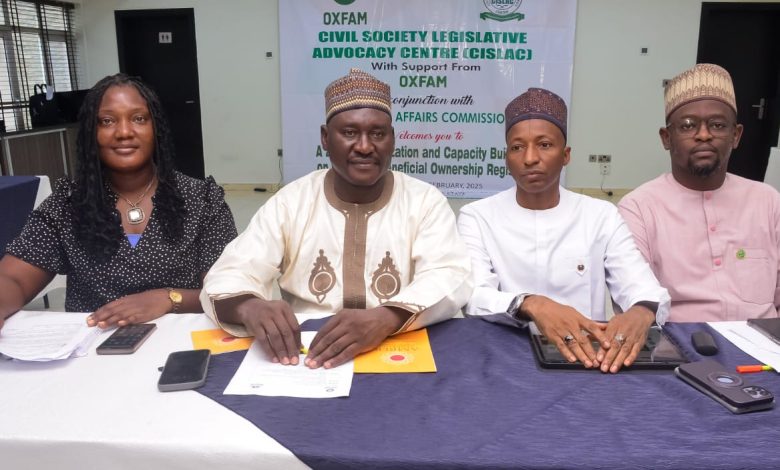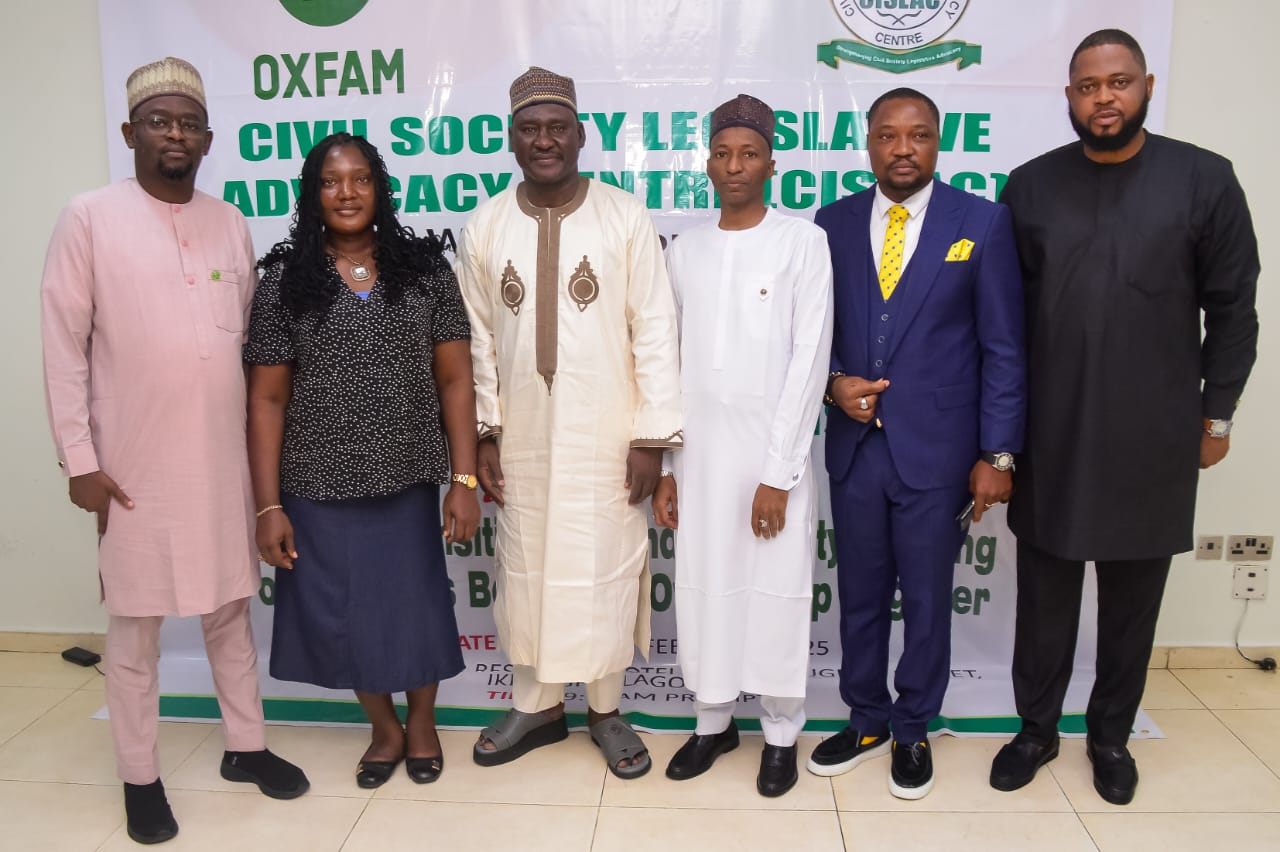Launch of PSC demonstrates Nigeria’s global leadership in financial transparency, Says Rafsanjani

By BASHIR ADEFAKA
Presentations on day one of the workshop on Wednesday bothered on development and objectives of the PSC Register by Salisu Abubakar of the CAC, and Demonstration of the PSC Register’s functionalities was done by Muhammed Abdullah, and his demonstration of them included how, outside of visitation of CAN offices, an individual can carry out a check on any acclaimed company as to whether it is registered and, if registered, who the persons behind the registration of the company are.
In furtherance to its tireless advocacy and sensational programmes and activities in ensuring reduction of corruption, a globally identified anti-development parasite of any society, that Nigeria and Africa may find their feet to transparent leadership and accountable governance, the Civil Society Legislative Advocacy Centre (CISLAC) with Support from OXFAM in collaboration with Corporate Affairs Commission, CAC, held in Lagos on Wednesday February 26th, 3025 held a 2-Day Sensitization and Capacity Building on Nigeria’s Beneficial Ownership Register.

At the event, held in Ikeja, Lagos State capital starting from Wednesday February 26, 2025 and ending Thursday February 27, had stakeholders including the chief host himself, Mallam Auwal Ibrahim Musa (Rafsanjani), the Executive Director of CISLAC, and the Registrar-General of Corporate Affairs Commission (CAC) in Nigeria, Alhaji Hussaini Ishaq Magaji (SAN), among other discussants as well as participants drawn from across the civil society organisations, anti-corruption and anti-corruption agencies and the media in attendance.

Speaking in welcome address, the CISLAC ED, Auwal Musa, stated that endemic corruption emanating largely due to lack of transparency.
Rafsanjani noted the need for effective collaboration in the anti-corruption business, saying that the civil society alone has no constitutional power of enforcement and wondered why, despite being invited to the all-important event, Nigeria’s leading anti-corruption agencies did not show up at the day one of the event to provide the needed contributions that are required to move the country forward in terms of commitment to reducing to the barest minimum if not exterminating it completely to – like said by former President Muhammadu Buhari – ‘kill the corruption before it kills Nigeria’.
He urged the media to expose people who hide under government influence and powerful individuals to perpetrate corruption in Nigeria as, according to him, they are indeed the prime anti-development agents militating against sustained national values, peace, unity and development of the country that is much touted to be the Africa’s giant.
“We know these people. If the government is serious about fighting corruption, they can deal with them. For instance, in the whole world, there nowhere something is called oil theft, it is only in Nigeria that is known and talked about. We have been asking.
He lamented that Nigerians suffer huge taxation and yet cannot access quality living system but, however, urged that Japa syndrome should not be the resort for Nigerians as “abroad they run to, if citizens of those countries do not stand in time of trials to fix their country, they would not find them” as greener pasture destination of choice to go for, he said, urging citizens not to lose hope as saying “we will fix it one day”.
Speaking further, Rafsanjani noted and appreciated the ccooperation and partnership provided to the successful planning and implementation of the ‘Sensitization and Capacity Building on Nigeria’s Beneficial Ownership Register’ and he named those collaborators working with his organization to be the Oxfam and Corporate Affairs Commission (CAC), thanking them for also making representation and commitment to enhancing corporate transparency and accountability in Nigeria.
He gave an insight to the workshop saying, “Today, we gather at a critical juncture in Nigeria’s fight against corruption, illicit financial flows (IFFs), tax evasion, and money laundering. Since the launch of Nigeria’s Open Central Register of Beneficial Ownership — also known as the Persons with Significant Control (PSC) Register — on May 25, 2023, our country has demonstrated global leadership in financial transparency. This milestone aligns with Nigeria’s commitment made during the Anti-Corruption Summit in London (2016) and places us at the forefront of corporate accountability efforts in Africa.
“The PSC Register is not just a database — it is a powerful tool for reform. By mandating the public disclosure of individuals with significant control over companies and Limited Liability Partnerships (LLPs), it dismantles layers of secrecy that enable illicit financial flows and corporate malpractice. More importantly, Nigeria is the first African country to adopt the Beneficial Ownership Data Standard (BODS), ensuring that our data is structured, globally interoperable, and useful for enforcement agencies, regulatory bodies, and civil society organizations.”
He gave objectives for the engagement as very clear ones “To 1. To Sensitize Key Stakeholders: Regulators, Business Membership Organizations (BMOs), Civil Society Organizations (CSOs), and the media must fully understand the existence, purpose, and functionalities of the PSC Register. 2. To Build Capacity: We aim to equip participants with the skills necessary to access, interpret, and utilize the PSC Register effectively in their respective fields. 3. To Foster Collaboration: Strengthening inter-agency partnerships is essential for combating illicit financial flows, tax evasion, and money laundering, while also ensuring the sustainability of transparency initiatives.”
He then explained impact that is expected to be that the engagement in the after-effect of the workshop will “*Strengthen multi-sector partnerships among regulators, civil society, and media organizations, fostering collaboration in tracking, detecting, and prosecuting financial crimes. *Enhance investigative capacity, ensuring that stakeholders effectively utilize the PSC Register to identify and mitigate corruption risks. *Improve compliance and enforcement mechanisms, ensuring that companies adhere to disclosure requirements, thereby reinforcing accountability in the corporate sector.”
According to him, “The Role of Beneficial Ownership Transparency in Governance’s Development Corporate secrecy has long been a breeding ground for corruption, money laundering, and illicit financial flows, which drain national resources meant for healthcare, education, infrastructure, and economic development. Nigeria loses billions of dollars annually to illicit financial flows, with shell companies and anonymous corporate ownership structures serving as key enablers of fraud and capital flight.”
In his keynote address, CAC’s Registrar-Genera Hussaini Ishaq Magaji (SAN), who was represented by Muhammed Abdullahi, an Assistant Director with the Commission, spoke about the collaboration with CISLAC in the successful organization of the workshop saying, “As we convene here in Lagos, we are united by a shared commitment to advancing transparency, accountability, and good governance in Nigeria, particularly through the effective implementation of the Beneficial Ownership Register.”
According to MaMagaji, the launch of Nigeria’s Beneficial Ownership Register in 2023, marks a significant milestone in our nation’s fight against corruption and illicit financial flows. This register, which publicly discloses the true owners of companies and limited liability partnerships (LLPs), is a powerful tool for promoting transparency and integrity in our business environment.”
Enumerating the importance of Beneficial Ownership Transparency, the CAC boss said it is crucial for several reasons and listed them as: Combatting Corruption: By revealing the individuals who ultimately control companies, we can prevent the misuse of corporate structures for corrupt practices and money laundering. Enhancing Accountability: Public access to beneficial ownership information empowers citizens, civil society organizations, and the media to hold businesses and public officials accountable, and, Promoting Fair Business Practices: Transparency in ownership helps create a level playing field for businesses, fostering a competitive and fair market environment.
He, however, told stakeholders what their own role should be, which was also demonstrated by his representative at the event in Lagos on Wednesday.
He said, “The success of the Beneficial Ownership Register depends on the active participation and collaboration of various stakeholders: Government Agencies: Regulatory and security bodies such as the Corporate Affairs Commission (CAC), the Nigeria Extractive Industries Transparency Initiative (NEITI), Bureau of Public Procurement (BPP), Federal Inland Revenue Service (FIRS), The Nigeria Police, Economic and Financial Crime Commission (EFCC), Department of State Security Service (DSS), Nigeria Financial Intelligence Unit, and many more play a critical role in maintaining and enforcing the register.
“Private Sector: Companies must comply with the requirements to disclose their beneficial owners, ensuring that their operations are transparent and lawful. 3. Civil Society: Organizations like CISLAC are essential in advocating for transparency, educating the public, and monitoring compliance with beneficial ownership regulations.
“Media: The media serves as a watchdog, investigating and reporting on beneficial ownership information to inform the public and expose any irregularities.”
Magaji listed the challenges and opportunities noting that, “While the implementation of the Beneficial Ownership Register presents challenges, such as ensuring accurate and timely data submission, it also offers significant opportunities: 1. Strengthening Governance: The register enhances our governance framework by promoting transparency and reducing the risk of corruption.
“ Attracting Investment: A transparent business environment attracts both domestic and international investors, boosting economic growth and development. 3. Building Trust: Transparency in ownership builds trust between businesses, government, and the public, fostering a more inclusive and accountable society.”
He then made a call to action saying, “As we conclude, I urge each of you to take proactive steps in your respective roles to support the Beneficial Ownership Register: 1. Government Agencies: Ensure rigorous enforcement and continuous improvement of the register. 2. Private Sector: Commit to full compliance and transparency in disclosing beneficial ownership information. 3. Civil Society: Continue to advocate, educate, and monitor to ensure the register’s effectiveness. 4. Media: Investigate and report on beneficial ownership data to keep the public informed and engaged.”
He then ended his keynote address by calling on stakeholders to champion transparency, accountability, and good governance in their various working environment and work collectively to make the Beneficial Ownership Register a cornerstone of fight against corruption and a beacon of integrity in Nigeria.”
Presentations on day one of the workshop on Wednesday bothered on development and objectives of the PSC Register by Salisu Abubakar of the CAC, and Demonstration of the PSC Register’s functionalities was done by Muhammed Abdullah, and his demonstration of them included how, outside of visitation of CAN offices, an individual can carry out a check on any acclaimed company as to whether it is registered and, if registered, who the persons behind the registration of the company are.
Essentially in his presentation outline, Salisu Abubakar, an Assistant Director at Nigeria’s CAC, delved into the Beneficial Ownership Register’s background, understanding of its legal and beneficial owner compared, statutory requirement its disclosure as to when, how, and who, and he talked about verification and sanctions for default or disclosure of wrong information as well as explaining the accessibility to BO information (BO Register) and then made his conclusion.
On level of compliance by corporate entities, Abubakar noted that, “The concept of Beneficial Ownership Transparency is new in Nigeria. The transition from manual records to electronic data commenced in January 2021 with the launching of the Companies Registration Portal (CRP) to lay a background to the eventual deployment of the BOR in May 2023.
“This background will explain that we have a large volume of manual records that are still being updated in the electronic system to ensure seamless BO compliance,” adding that, statistics so far have shown the level of compliance stands at 53.12%. He gave a summary data of compliance between January 2021 – December 2023 at 728,332; January 2024 – December 2024 at 475,528; January 2025 at 24,378 and that, so far in yet to end February 2025 he put level of Beneficial Ownership Register by corporate entities at 20,131 totaling 1,248,369 compliances recorded with 2,350,065 companies and LLPs breaking down the 53.12% compliance.
Dr. Isaac Botti, in his presentation centering on Legal Framework and Compliance, led a discussion on the legal obligations of companies under the PSC regulations and the penalties for non-compliance and the role of enforcement agencies. He said, “Section 119(3) of the Companies and Allied Matters Act (CAMA) 2020 mandates the Corporate Affairs Commission (the “CAC”) to maintain a register of persons with significant control, also known as the Beneficial Ownership Register (“The Register”) in the relevant entities. The Register is accessible online at “bor.cac.gov.ng”.
Dr. Lawrence Dube, in his presentation on the Role of Stakeholders in Beneficial Ownership Transparency, presented an interactive discussion that featured representatives from regulators, BMOs, CSOs and the media. A case studies on successful interagency collaborations was also held after which Dr. Dube made the final presentation for the day one on Challenges and Opportunities in Implementing the PSC Register.
The day was ended with a group work identifying potential challenges and proposing solutions.









